- Home
- K. R. Alexander
Storm Page 4
Storm Read online
Page 4
“So, on the plus side for future generations who might rebuild here,” Trent said, “they’ve got a three-hundred-year cycle of safety ahead?”
“Who knows?” Ramak said, watching out the back. “But it might not matter. The ground shelf has dropped. Seattle might be rebuilt to some extent—somewhere, someday. But it won’t be in the same place.”
“I read about those predictions when I first moved to the area,” I said, shivering and zipping up a coat. “How the West Coast would ‘fall into the ocean’ eventually. I never thought about actually being around for it.”
“No one thinks it will happen to them,” Ramak said, tone as soft as mine, all of us sort of trancing. “Just look at how unprepared we were for a major pandemic. Medically, publicly, governmentally…”
“And don’t forget toilet paper,” Trent said. “Seriously unprepared.”
“Man…” Jackson said. “If I could do one thing differently, I’d have bought stock in Charmin.”
That even made Ramak snort, while Trent and I were cracking up.
“The first time I went into a store and that was the only aisle gutted, like in January, I thought it was a fluke,” I said. “Little did we know…”
“I actually teepeed houses in my day,” Jackson said.
“For free?” Trent asked. “Solid gold, dude.”
“I know, right? Can you imagine such a reckless, wasteful youth?”
“We had a cat who used to spin through the roll,” I said. “Little paws peddling like she was getting a workout.”
Toilet paper anecdotes and jokes carried us for several minutes. It made the darkness of a smoky gray world outside seem less dark, the wait less coffin-like, which made me think of the other wait. The lockdown, quarantine, no contact sort of wait. The all alone wait.
“Guys?” I said quietly when we’d hushed again. “I know this sucks and I’m so, so sorry about what’s happening and so many people being dead and stranded and who even knows what all, but … if it had to happen … I’m glad the isolation is over. I’m glad to be here with you.”
“Same here,” Jackson said. “I had cabin fever after three days. Talking to hand puppets sort of crazy after a week.”
“It’s not technically over, you know,” Ramak said, finally shifting from his gaze to glance at me over the backs of the seats. “Technically, we’ve broken our stay-home orders. The nation’s resources already being flattened and so many dead is one reason the response from rescue efforts is still failing to make itself felt anywhere that we’ve seen. They’re somewhere now, but not everywhere. When we do reach anyone, refugees and residents in Cle Elum or Ellensburg, one of the priorities is going to be keeping people separated all over again.”
I stared into the gray window, so dark I could see my own reflection when I shifted focus. Then, softly, “I can’t go back to that. I know we’re doing it for each other. I know we have to. I know we’re saving lives. Stay home, distance learning, video chat your gaming group and all that. We have to. If it saves lives, and it does, then we can do it, and we can get through it. But after this … maybe it’s too early to start worrying about post-trauma, but I can’t do that again right now. If we get to Ellensburg and they tell us we have to split up into … tent rooms or something … if I still can’t get to family … or…”
“No one’s going to send you off alone, Brook,” Jackson said just as quietly. “No one. Not the Sheriff of Ellensburg, or doctors, or FEMA.”
“That’s right,” Trent said, turning against his seat and reaching back to me. “We’re with you now. We’re all in this.”
I took his hand.
“Like families stay quarantined in their homes together,” Jackson said. “That’s us now. And family is a ‘like it or not’ situation. Just what we’ve got here. Eh, Ramak?”
“Could be a lot worse.” Ramak shifted in the back, startling me when he rested a hand on my shoulder.
I covered his with my free hand, nodding, whispering, “Thanks, guys,” as a couple of tears escaped my lashes, and the four of us went on gazing outside together.
Chapter 9
All day, all the next night: still falling. We rotated our seats, Ramak and I taking a turn up front, then pulling down the back seats, piling all the bags we could into the driver’s seat, and Trent, Jackson, and I all squeezing into the back after setting the cooler outside. Ramak couldn’t have been comfortable, unable to put the passenger seat back much with this arrangement, but the rest of us finally got some sleep.
We played “at least” on the second morning as we waited for the day to grow lighter. As in, “At least we have some food left.” “At least we’re getting a couple days to heal.” “At least the CR-V owners didn’t lock their car—although too bad they didn’t have a Suburban.”
This got us talking about cars—ones we liked, didn’t like, used to have, wanted, etc. Which led to technology in general, social media, and all that. It was odd, yes, we were desperate for news and a phone call to family to announce we were alive and check on them, but, hard to believe, I hadn’t missed my phone or streaming one bit. Hardly thought of any of that, only for the sake of communication—which suddenly seemed the most precious, overlooked gift of modern man. Otherwise, even now, even sitting in a car for days, I didn’t want a movie, didn’t want a game or to browse Instagram. I just wanted people, extra bottles of water, and those gooey, pull-apart cinnamon rolls that come in tubes in the refrigerator aisle in the grocery store—extra cinnamon and with pecans added.
I had to prompt both Ramak and Trent often to stay in the conversations. Trent’s attention wandered, zoning out as he watched the windows, or just sitting there, watching us, contemplating challenges of filming in difficult sets like submarines and drifting lifeboats. Naturally quiet, Trent was at least easy to draw out. Ramak was more of a challenge but he was coming along. With everyone twisted up together and trying to rearrange, he left us giggling when he said, “At least there aren’t more of us.”
By the middle of the second day, which we had to guess at because the light never grew any brighter than smoky dawn, the ash had subsided—somewhat.
We couldn’t wait any longer. Besides brief steps outside to work out stiffness, wilderness toilet, and hopefully prevent blood clots, we’d been trapped, we suspected, for thirty-six hours. No matter how small we made our sips and nibbles, we were using up limited supplies, starving, parched, and we’d run out of choice.
We sorted and packed the gear, tied kitchen towels and microfiber around our faces, tucking them into coats, pulling up hoods, wrapping up in all we had as if to face a real snow blizzard, and finally opened all the doors.
My stiff new shoes sank into three inches of ash that puffed like talcum powder. The fragments fluttered, fine particles making a sort of smoke that could not be kept from eyes and lungs. The eerie light was gray-brown, visibility good for fifty feet, rapidly breaking up after that. And the silence… More bone-chilling than even the creepy urban silence. There, at least, you knew there were people just behind the doors.
Trent snuck his hand into mine. I squeezed.
Jackson set out in the lead, moving briskly, much healed from his wounds, as were my feet, shoulder, and bruises. At least … so many blessings. If only we had a literal saucer to drink from. Except it would fill up with ash.
We walked down I-90 in a deep hush, along the parked cars and almost invisible lake to our right, through a missing world, four souls in the clouds.
After several hundred yards, Trent caught my eye. “You know what I’m thinking?” It didn’t surprise me that he whispered. Anything above a whisper would have been the surprise.
“Epic dystopian fantasy? Or just post-apocalyptic?”
His eyes crinkled, grinning under the mask. “The shame of it is it’s all going to have to be CGI. Like that cougar.”
“Wow…” I shook my head. “Forget about water and a hot meal and showers. We’ve got to get you a camera from someone in Cle Elum.
”
Trent laughed a little, pressed my hand, and we walked on through this endless, silent storm.
Chapter 10
When we were all coughing, the light failing even more, presumably with sunset, we started hunting for a “rental cabin”—as Jackson inventively called them—by pulling at likely door handles. We set off some alarms, kept walking, and finally found a red Kia Sedona.
We shook everything off as best we could, holding our breaths, then piled into the minivan.
Another long night, coughing so much in those first couple hours, then so uncomfortable, no one slept much.
They had half a roll of paper towels in here and I made the best use I could of them with a tiny dab of soap and water. It’s amazing what a washed face and mouth rinsed with toothpaste will do for the spirits of someone waking to a morning of limited luxuries.
Spirits were lifted all around to discover on the next day’s hike that the chunky ash had finally stopped falling, the sky noticeably lighter this morning. Now no darker than a heavily overcast day of storm clouds, with a smoky haze everywhere, visibility also opened up.
And there, a mile sign for Cle Elum. Major milestone.
I think even Ramak was secretly smiling behind his mask when we reached the Cle Elum exit. Walking through puffs of ash and stinging smoke, inhaling a smell of fires and hints of sulfur on every breath, we were less excited to find that the traffic jam ended here: an overpass collapsed, blocking the interstate, then a tangle of vehicles and accidents trying to go off-road, or on damaged ramps, and not making it. All together hundreds of vehicles made an impassable snarl that nothing short of a helicopter could get over. We’d known we must find the end somewhere, that the quake had devastated roads. This overpass must have held up for a while, many thousands of evacuees pouring below it after the quake but before the structure gave way.
It was none of this that brought our spirits crashing down. It was that the jam vanished beyond this final mess. The next stretch of I-90 was wide open. No FEMA, or anyone else, on the other side.
We started into town, looking to a service station one way and emptiness of I-90 in another. It was clear, even through this smog, that buildings had been battered and glass blown out.
“I hadn’t thought the quake would have been this bad here.” I forced my attention ahead, away from the interstate, as we picked our way past cars and down West 1st Street.
“I hadn’t thought the ash would be,” Jackson said.
We stopped between a grocery store and motel, in the middle of the three-lane road, and it seemed we were all listening.
“Hello!” Jackson yelled, nearly in my ear, and I jumped.
“Jackson!”
Ramak caught my shoulders as I crashed into him with my backpack, mask slipping.
“Sorry.” Jackson turned, puzzled at my reaction.
Trent also swore and coughed on a sudden intake of breath.
I struggled to fix my towel through a fit of coughing while Ramak tried to help with the knot.
“Dude, don’t do that,” Trent said. “Can’t walk into a place like this and start shouting.”
“We can’t?” Jackson shifted from me to him. “Why?”
“Cannibals, of course.” Trent coughed, looked around, then to us. “What?” We were all staring at him. “Come on, guys.” He extended both arms to take in Cle Elum. “Tell me this isn’t cannibal central.”
“I don’t think we’re there yet…” Ramak frowned.
“I don’t know, dude. I’m pretty hungry.”
I laughed, which got ash into my lungs and took five minutes to be able to walk and talk again, having to use our last water.
There were no cannibals in Cle Elum. Nor zombies or alien invaders, if anyone wants to know. There were no people at all in Cle Elum, in fact, though many roving animals—darting shadows in a background of ash. Mostly cats, but we spotted deer, raccoons, dogs, and I’m not sure what all.
We walked, knocked on doors, called out, and finally returned to our standby—looting—when we could find nothing and no one else.
Chapter 11
We weren’t as lucky as we’d been in North Bend, where people had simply loaded their cars with a few bags and peeled out. Here, thousands of refugees had already passed through town. It was another Safeway, not so damaged from the quake that we couldn’t get in and move about most of the store, and minimally ash-coated inside. But it was also stripped. What little could be found was on the floor from the shaking and had been pillaged by local critters.
We split up and finally managed to find some candy and gum around the registers, and Trent made the discovery that lots of freezer food had been left alone. Glass doors shattered, everything so dark we had to use the flashlights, bags and boxes ripped on the floor with tiny paw marks in evidence, still some on the wire shelves. Who knew how much raccoons love frozen pizza?
“Is it eatable?” I asked, towel mask pulled down like the others. “We can’t afford to get sick from this stuff. What’s the lowest risk? Maybe vegetables? Nothing with meat or dairy.”
“It is pretty cold in here,” Jackson pointed out. “Even if it’s a bit off, most of this shouldn’t hurt us. How long has it been since losing power?”
“Gee… Now you ask.” I shook my head.
“Six years,” Trent volunteered.
We grinned at that.
“About eight or nine days,” Ramak said.
“What we really need is water,” Trent said dejectedly, looking around at the remains of the pizza party.
Ramak stepped to one of the shelves and pulled out a bag of green beans. Instead of making a crunchy noise, as frozen food has a way of doing, it sloshed in his hand. Ramak held it up at Trent and shook it—splash.
“Oh…” Trent’s eyes widened.
I threw my arms around Ramak. “You are so my hero right now. If I live to get another smartphone, you just got upgraded to the list of people to call at two in the morning in an emergency.”
I almost thought he’d push me off; nothing about Ramak says, Free hugs! But he smiled. “I thrive in an emergency.”
“You totally do. Who has the pocket knife?”
We cut the corners off of one bag apiece, bit the open corner, and tipped the bags up to squeeze out the liquid. Then we had another. The frozen corn was the best, sweet and starchy, but the beets were great too, rich and earthy, staining my teeth and lips purple—so I was told. Finally some makeup.
We slashed the bags the rest of the way open and left the pulp out front in the ash for deer and others. It must be a rough time to be Cascade wildlife.
“Look at that.” Trent pointed out a couple of skittish dogs at the corner of the building, watching through smog.
“Poor things,” I said. “Can you imagine having to leave your pets when you evacuate?”
“Come on,” Jackson said.
The pet food was one area that had hardly been raided, with bags and cans all over the place. We pulled down dozens more bags of dry cat and dog food from anchored metal shelves, then scattered sacks all over the store and outside in the ash, leaving kibble in the bags, but cutting slits down them like opening a zipper. Raccoons and coyotes might get a lot of it, and maybe we weren’t bringing forth any miracles, but maybe it made a difference for a few desperate dogs and cats who were right now being prayed for and missed. Millions of small things make up a blizzard.
We found shelter in one of the motels across the street, bringing packs of thawed food. It took smashing up chairs in the breakfast room, beating them on the parking lot and stirring up massive clouds of ash, to make a fire. We built this in gravel at a lee, where a wall was split and corner of the motel sloped down like an A-frame. Here was some shelter from ash getting in our little camp pot from the North Bend gear, which worked well enough to cook up a strange feast.
We ate all we could hold of vegetables, fruit, and a few vegan entrées like teriyaki vegetable tofu on rice that we hoped was safe once heated. Some
things did taste a little funky, and it was one of the strangest meals of my life, but I’ve never been so grateful for plenty. We feasted and talked about what we could get for breakfast, Ramak joining in with us, sharing out of the pot as we heated one or two things at a time and only had a few camp utensils—two spoons, two forks, and the pocket knife.
Ramak was obviously aware of this thing between Trent and Jackson and I. No one had been feeling much romance in the air while trapped in those cars, but we weren’t hiding being affectionate either. Again, I felt the need to say something to Ramak—explain ourselves. Not with everyone present. Too many weird implications, no time to distract from our main course—delightful peas and carrots mixed into mashed potatoes—but it was starting to bug me.
Why? Because I wanted Ramak in on it, or just because I wanted to be open and transparent, not feel weird about trying out this type of relationship? What if Ramak took some personal or religious issue with our triangle? He’d given no hint of this, or of following any particular faith as far as I’d noticed. Sure, he had a bit of an attitude, but he had all along.
Yes, I wanted to say something, but how and where mattered. Sharing of information, no ulterior motive, no wink-nudge. It was hard to think of a way even to bring up the matter without it sounding like that.
I was surprised to have a moment alone with Ramak when Jackson went to find us structurally sound rooms and Trent followed. Normally I’d have been on an explore mission myself. Instead, I watched the fire, hoping Ramak stayed put, yet at a loss for what to say. In fact, I literally couldn’t think of anything to say for a couple of minutes as the two of us sat alone on chairs from the breakfast room.

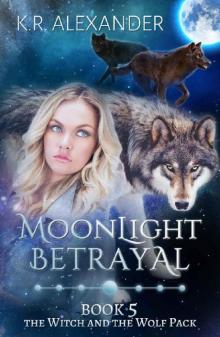 Moonlight Betrayal: A Reverse Harem Shifter Romance (The Witch and the Wolf Pack Book 5)
Moonlight Betrayal: A Reverse Harem Shifter Romance (The Witch and the Wolf Pack Book 5) The Undrowned
The Undrowned House of Darkness
House of Darkness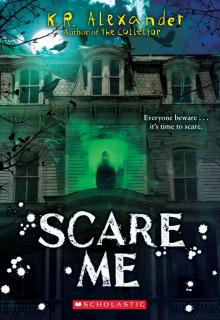 Scare Me
Scare Me Moonlight Lovers: A Reverse Harem Shifter Romance (The Witch and the Wolf Pack Book 7)
Moonlight Lovers: A Reverse Harem Shifter Romance (The Witch and the Wolf Pack Book 7) Moonlight Journey: A Reverse Harem Shifter Romance (The Witch and the Wolf Pack Book 6)
Moonlight Journey: A Reverse Harem Shifter Romance (The Witch and the Wolf Pack Book 6) Storm
Storm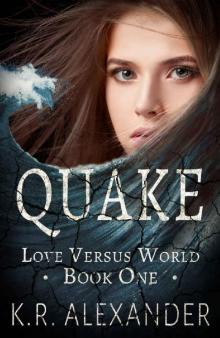 Quake
Quake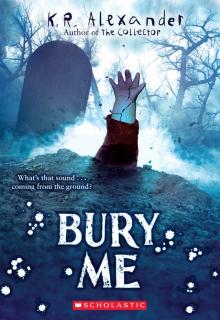 Bury Me
Bury Me The Fear Zone 2
The Fear Zone 2 Fox’s Night: A Foxy Reverse Harem Shifter Romance (Foxes of the Midnight Sun Book 3)
Fox’s Night: A Foxy Reverse Harem Shifter Romance (Foxes of the Midnight Sun Book 3) Moonlight Whispers: A Reverse Harem Shifter Romance (The Witch and the Wolf Pack Book 8)
Moonlight Whispers: A Reverse Harem Shifter Romance (The Witch and the Wolf Pack Book 8)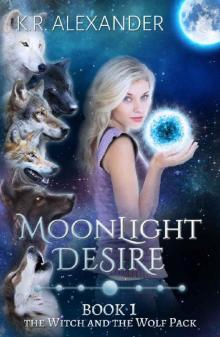 Moonlight Desire: A Reverse Harem Shifter Romance (The Witch and the Wolf Pack Book 1)
Moonlight Desire: A Reverse Harem Shifter Romance (The Witch and the Wolf Pack Book 1) The Fear Zone
The Fear Zone Moonlight Heart: A Reverse Harem Shifter Romance (The Witch and the Wolf Pack Book 4)
Moonlight Heart: A Reverse Harem Shifter Romance (The Witch and the Wolf Pack Book 4) House of Chaos
House of Chaos Moonlight Hunters: A Reverse Harem Shifter Romance (The Witch and the Wolf Pack Book 2)
Moonlight Hunters: A Reverse Harem Shifter Romance (The Witch and the Wolf Pack Book 2) Fox's Quest: A Foxy Reverse Harem Shifter Romance (Foxes of the Midnight Sun Book 2)
Fox's Quest: A Foxy Reverse Harem Shifter Romance (Foxes of the Midnight Sun Book 2) Fox’s Dawn: A Foxy Reverse Harem Shifter Romance (Foxes of the Midnight Sun Book 1)
Fox’s Dawn: A Foxy Reverse Harem Shifter Romance (Foxes of the Midnight Sun Book 1)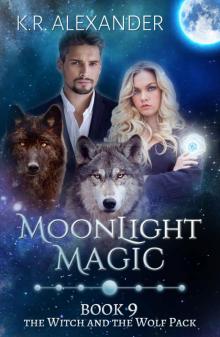 Moonlight Magic: A Reverse Harem Shifter Romance (The Witch and the Wolf Pack Book 9)
Moonlight Magic: A Reverse Harem Shifter Romance (The Witch and the Wolf Pack Book 9)